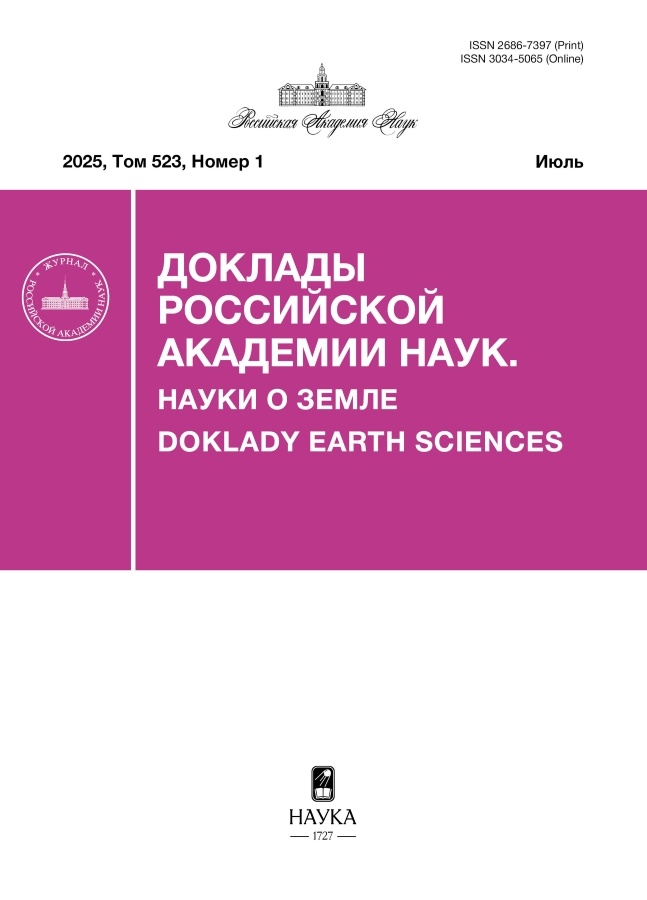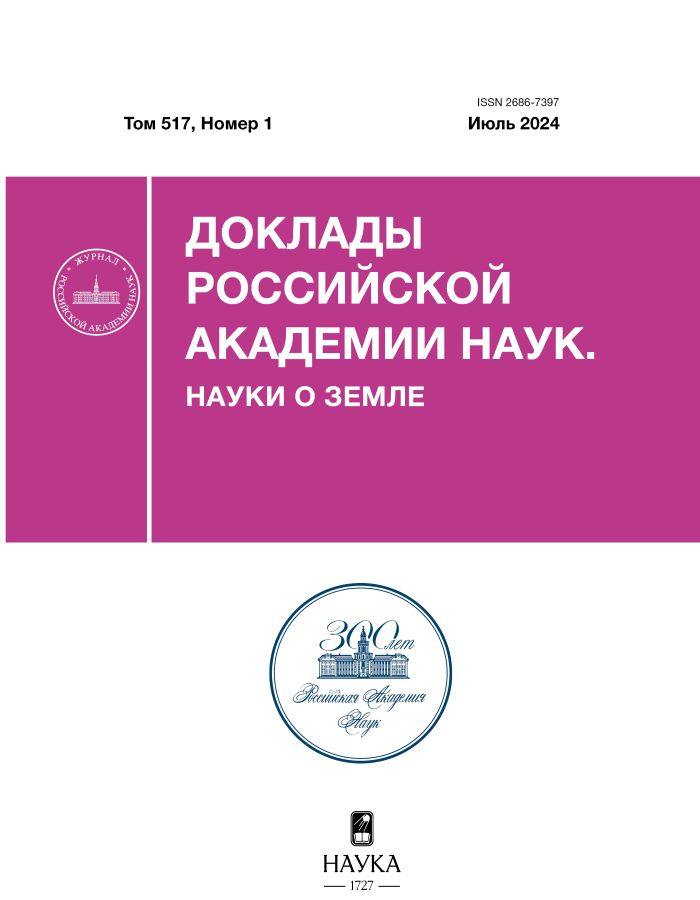Динамические характеристики стратосферных полярных вихрей
- Авторы: Зуев В.В.1, Савельева Е.С.1,2
-
Учреждения:
- Институт мониторинга климатических и экологических систем Сибирского отделения Российской Академии наук
- Институт физики атмосферы им. А.М. Обухова Российской Академии наук
- Выпуск: Том 517, № 1 (2024)
- Страницы: 160-170
- Раздел: ФИЗИКА АТМОСФЕРЫ И ГИДРОСФЕРЫ
- Статья получена: 31.01.2025
- Статья опубликована: 13.12.2024
- URL: https://edgccjournal.org/2686-7397/article/view/650012
- DOI: https://doi.org/10.31857/S2686739724070173
- ID: 650012
Цитировать
Полный текст
Аннотация
Впервые представлены динамические характеристики стратосферных полярных вихрей на уровнях от 100 до 1 гПа (минимальная площадь вихря, минимальная средняя скорость ветра по границе вихря и минимальная скорость ветра, при которой сохраняется динамический барьер), рассчитанные с использованием метода оконтуривания вихрей с помощью геопотенциала на основе данных реанализа ERA5. Получены сезонные изменения и усреднённые зимние вертикальные профили площади вихря, средней скорости ветра по границе вихря и средней температуры внутри вихря для антарктического и арктического полярных вихрей. Определена среднесуточная вероятность ослабления динамического барьера по границе вихря в зимний период по данным за 1979–2021 гг. в Арктике и Антарктике. Показано, что наиболее низкая вероятность ослабления динамического барьера (и возможного разрушения полярного вихря) в зимний период прослеживается на уровнях от 30 до 3 гПа и достигает менее 50% в Арктике и менее 1% в Антарктике. На уровне 50 гПа вероятность ослабления динамического барьера составляет 53.7% в Арктике и 1.4% в Антарктике.
Полный текст
Об авторах
В. В. Зуев
Институт мониторинга климатических и экологических систем Сибирского отделения Российской Академии наук
Автор, ответственный за переписку.
Email: vzuev@list.ru
Член-корреспондент РАН
Россия, ТомскЕ. С. Савельева
Институт мониторинга климатических и экологических систем Сибирского отделения Российской Академии наук; Институт физики атмосферы им. А.М. Обухова Российской Академии наук
Email: vzuev@list.ru
Россия, Томск; Москва
Список литературы
- Scherhag R. Neue Methoden der Wetteranalyse und Wetterprognose. Berlin: Springer, 1948. 424 p.
- Gutenburg B. New data on the lower stratosphere // B. Am. Meteorol. Soc. 1949. V. 30. № 2. P. 62–64.
- Brasefield C. J. Winds and temperatures in the lower stratosphere // J. Meteorol. 1950. V. 7. № 1. P. 66–69.
- Palmer C. E. The stratospheric polar vortex in winter // J. Geophys. Res. 1959. V. 64. № 7. P. 749–764.
- Farman J. C., Gardiner B. G., Shanklin J. D. Large losses of total ozone in Antarctica reveal seasonal ClOx/NOx interaction // Nature. 1985. V. 315. № 6016. P. 207–210.
- Holton J. R. The dynamics of sudden stratospheric warmings // Ann. Rev. Earth Planet. Sci. 1980. V. 8. P. 169–190.
- Holton J. R., Haynes P. H., McIntyre M. E. et al. Stratosphere-troposphere exchange // Rev. Geophys. 1995. V. 33. № 4. P. 403–439.
- Kolstad E. W., Breiteig T., Scaife A. A. The association between stratospheric weak polar vortex events and cold air outbreaks in the Northern Hemisphere // Q. J. Roy. Meteor. Soc. 2010. V. 136. No 649. P. 886–893.
- Hersbach H., Bell B., Berrisford P. et al. The ERA5 global reanalysis // Q. J. Roy. Meteor. Soc. 2020. V. 146. № 729. P. 1–51.
- Zuev V. V., Savelieva E. Stratospheric polar vortex dynamics according to the vortex delineation method // J. Earth Syst. Sci. 2023. V. 132. № 1. P. 39.
- Lawrence Z. D., Manney G. L., Wargan K. Reanalysis intercomparisons of stratospheric polar processing diagnostics // Atmos. Chem. Phys. 2018. V. 18. № 18. P. 13547–13579.
- Smith M. L., McDonald A. J. A quantitative measure of polar vortex strength using the function M // J. Geophys. Res. 2014. V. 119. № 10. P. 5966–5985.
- Варгин П. Н., Кострыкин С. В., Ракушина Е. В. и др. Исследование изменчивости дат весенних перестроек циркуляции стратосферы и объема полярных стратосферных облаков в Арктике по данным моделирования и реанализа // Известия РАН. ФАО. 2020. Т. 56. № 5. С. 526–539.
- Vargin P., Kostrykin S., Koval A. et al. Arctic stratosphere changes in the 21st century in the Earth system model SOCOLv4 // Front. Earth Sci. 2023. V. 11. P. 1214418.
- Vargin P. N., Kostrykin S. V., Volodin E. M. et al. Arctic stratosphere circulation changes in XXI century in simulations of INM CM5 // Atmosphere. 2022. V. 13. № 1. P. 25.
- Лукьянов А. Н., Варгин П. Н., Юшков В. А. Исследование с помощью лагранжевых методов аномально устойчивого арктического стратосферного вихря, наблюдавшегося зимой 2019–2020 гг. // Известия РАН, ФАО. 2021. Т. 57. № 3. С. 278–285.
- Zuev V. V., Savelieva E. Antarctic polar vortex dynamics depending on wind speed along the vortex edge // Pure Appl. Geophys. 2022. V. 179. № 6–7. P. 2609–2616.
- Holton J. An Introduction to Dynamic Meteorology. 4th Edition. California: Academic Press, 2004. 535 p.
Дополнительные файлы

















